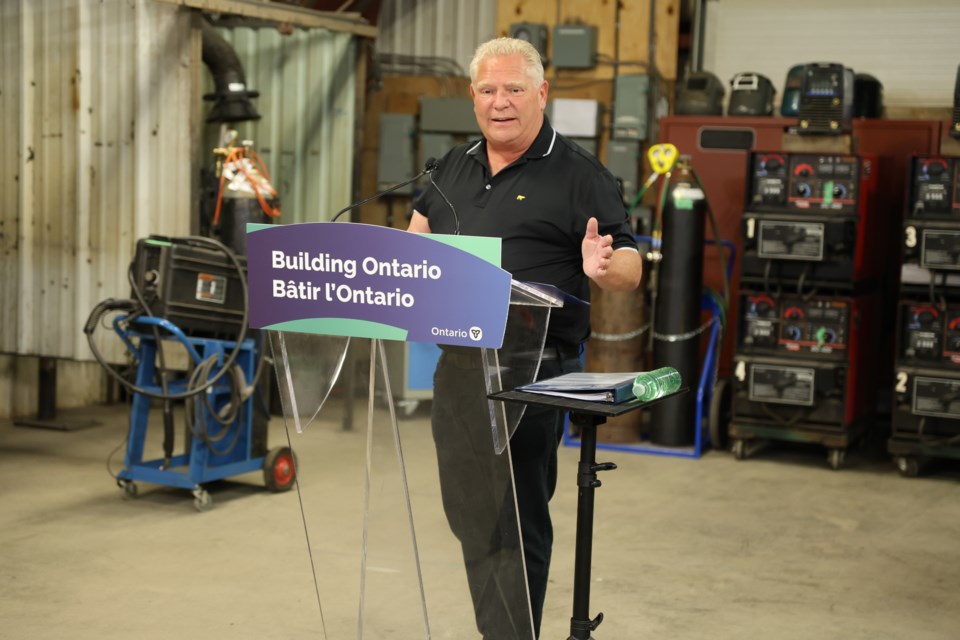THUNDER BAY — The province is putting millions of dollars to train more people for jobs in the trades, specifically in Northwestern Ontario.
Premier Doug Ford and David Piccini, minister of labour, immigration, training and skills development, made an appearance in Thunder Bay at Ironworkers Local 759.
The pair announced the province’s nearly $17 million investment through the Skills Development Fund to train over 36,000 workers in the mining, construction, energy and forestry sectors.
Ford and Piccini were joined by local dignitaries, Parliamentary Assistant Kevin Holland, Minister of Mines George Pirie, and representatives from the organizations set to receive funding.
Premier Ford said he was thrilled to be back in Thunder Bay and even more thrilled about what this announcement means for communities in the North.
“These investments will help train thousands of workers throughout Northern Ontario – for better jobs that deliver better, bigger paycheques. . . It will help build the homes, hospitals, schools, highways, and other critical infrastructure that the region needs.
"It will help attract new investments and spur economic growth here in Thunder Bay and throughout the north. It’s another important step as we work together to unlock Northern Ontario’s tremendous economic potential,” he said.
“I always say we can’t build infrastructure, and we can’t attract investments if we don’t have the workers.”
The announcement includes the construction of new training facilities for Science North, Sheet Metal Workers Union Local 397, and Ironworkers Local 759.
This funding also aims to boost training and accessibility for First Nations in the region, with $1 million going to Keewaytinook Okimakinak for training in carpentry and other building trades.
Close to $10 million is being invested to Agnico Eagle Mines Limited to train people for careers in mining in partnership with Matachewan, Taykwa Tagamou, and Moose Cree First Nations.
Finally, $580,000 has been dedicated to the Northern Centre for Advanced Technology (NORCAT) to deliver training programs focused on skills and safety knowledge across the forestry, mining, exploration and energy development sectors as well.
Speaking to the media, Piccini echoed Ford’s remarks and said this funding is ultimately about developing a robust workforce that can withstand changes in the Canadian economy and “look to where the puck is going.”
“NORCAT is doing it in Terrace Bay right now with their Action Centre and we’re keen to ensure our workforce is nimble and go from job-to-job. There are so many of them that are needed,” he said.
He also responded to recent fluctuations in the market for lithium and whether or not the province is concerned about how that could affect the EV supply chain.
“There’s always ebbs and flows in markets, but I think that when you look to the estimated supply and some exploratory work that’s going on. . . Agnico Eagle - $2.2 billion they’re investing just in exploratory work and two potential mine sites.
“I don’t want to be dependent on China for nickel.
"China’s cornering the market when it comes to a number of rare earth minerals, and we have an imperative. It’s all connected – we need the federal government. I applaud our collective work for de-carbonization but you can’t make the process so long that we actually miss out on the opportunity."
He reiterated the provincial government is working with First Nations communities and leaders to realize a collective vision of economic prosperity.
“We’re working together to make sure that those workers have the skillsets for the jobs of tomorrow, be it in mining, be it in forestry.
"We’re very confident that, regardless, we’re going to need these critical minerals for a variety of functions from the US military to electric vehicles to the tradesmen and women and ironworkers for the power production we need,” he said.
